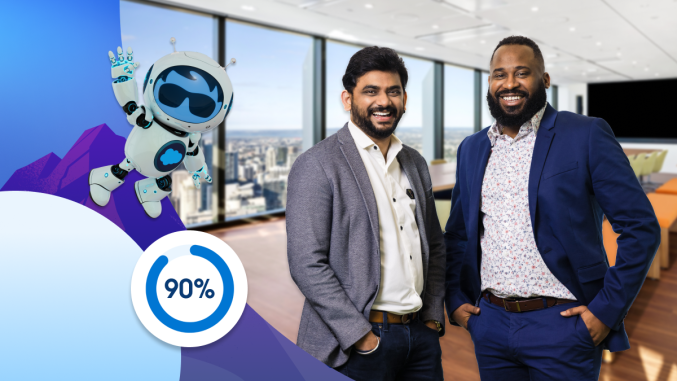Broadcasting
Marketing & Retail Trends 2024

The more data accumulates, the greater the likelihood that additional services and applications will access this data. However, the uncontrolled accumulation of large amounts of data is not expedient and leads to system inertia, so reducing this “data gravity” will be an important goal in 2024.

Photography for SAS in April 2017 by Jeremy Glyn.
As part of this, we expect IT and marketing departments to invest more in technical solutions to harmonise different data sources. This will give them more control over their data and at the same time more flexibility to focus on creative tasks, such as the conception and implementation of creative campaigns.
Generative AI places an even greater focus on building better quality data bases. The principle of “garbage in, garbage out” applies particularly well to generative AI (artificial intelligence). Already, 77% of managers are concerned that their company will not be able to take full advantage of generative AI due to poor data quality (source: Salesforce State of Data & Analytics, November 2023). With total data volumes predicted to increase by an average of 23% in the next 12 months alone, IT and business departments are in a race to ensure the quality of the data underpinning their generative AI initiatives is better than their competitors.
AI prompting – Questions are becoming more important than answers
What questions and prompts do we feed artificial AI with? This is what companies will be dealing with in 2024. A key challenge in dealing with AI will be which core competencies marketers should have. Companies will have to spend more time on how they ask questions in order to not only get meaningful answers, but also to gain insights that set them apart from others.
Salesforce will help its customers with the Prompt Builder. Because in the future, it will be about overcoming conformity as more and more companies use AI for their marketing. It is also crucial to evaluate success factors for how AI models are trained. The use of AI will not replace employees, but rather relieve them of manual tasks. In the interaction between humans and machines, they remain the decision-makers.
First party data strategy and loyalty programs – loyalty will have no limits
Loyalty is increasingly seen as a central component of the customer experience in many companies and is increasingly becoming a top priority. Until now, customer loyalty programmes have often been transaction-oriented and relatively inflexible. In future, however, loyalty experience will become a central component of the entire customer journey. From in-store advisory services and customer-centric service centres to mobile apps and virtual experiences, there are virtually no limits.
The basis for this? First-party data! With a first-party data strategy, companies answer questions such as: Where can I find out more about customers? Where can I learn more about their interests? And how can I use these insights in real time? The “reach” yardstick, which was very high with third-party cookies, is therefore out. The watering can principle is no longer relevant in marketing; precision is more important than ever.
Retail media – continues to gain ground
Addressing customers when they are in the mood to buy – this makes retail media one of the most important marketing trends in 2024. The ROAS (return on advertising spend) for retail media is high compared to other forms of online advertising. Retail Media benefits from the seller’s detailed first-party data: advertisers can market their products to a very specific target group by booking banner advertising with the retailer for a target group with an interest in certain products.
Personalisation – Cool or creepy?
One of the challenges in the coming year is how companies can get consumers to trust them with their data in order to create added value through personalisation with first-party strategies. According to the Salesforce State of Connected Customer Report, consumers are becoming increasingly sensitive when it comes to personal data. Transparency is therefore still one of the most important tasks for companies, as the unsolicited disclosure of data is a “no-go”, and they only trust companies to a limited extent when it comes to handling data.
There is also a considerable discrepancy in how this data is handled: Consumers often find it “creepy” when they are approached by companies in a personalised way without knowing where the company has the relevant information. So when it comes to the question of whether personalised marketing is a criterion for success, the only questionable answer is: it depends. Ikea recognised this a few years ago with its “Ikea Data Promise” and showed what is important: guaranteeing consumers security, transparency and control of their data and showing them how they benefit in concrete terms when they share their data with companies.
Broadcasting
NCC, MCSN Collaborate on Copyright Enlightenment

The Nigerian Copyright Commission (NCC) in collaboration with Musical CopyrightSociety of Nigeria (MCSN) organised a stakeholders’ engagement and awareness event in Kaduna on November 20, 2024.

The event, themed “Enjoy Music, Respect Copyright, Protect your Business,” according to the State Coordinator, NCC Kaduna office Mrs Rukayya Yeldu was aimed at educating music users about copyright laws and the importance of paying royalties to support musicians in the creative industry.
Mrs. Yeldu in her address at the event noted that copyright laws help protect the livelihood of musicians and other stakeholders while emphasising that paying royalties is both a legal and moral duty for business operators in the creative sector.
Director-General, MCSN Mr. Mayowa Ayilaran in his presentation spoke about MCSN’s role in the creative sector and encouraged business owners to obtain proper licences for the music they use.
Broadcasting
90% of Global Constituents Support AI Agents in Public Service, Salesforce Finds

Public trust in government has been lagging for years but new Salesforce research reveals AI agents could help rebuild it.

Constituents around the world agree there’s room for improvement when it comes to government service. Forty percent struggle with government interactions, and over a third are unsure of available programs. However, the research indicates overwhelming public support for AI solutions — with 90% of global constituents saying they’d use an AI agent to engage with their government.
The arrival of AI agents presents governments with an exciting opportunity to strengthen public trust by streamlining services and speeding up response times. And in the face of tightening budgets, agents can augment public servants and better serve their constituents — without having to add headcount.
“It is clear from our research that there is a need for AI solutions like Salesforce’s Agentforce that help governments streamline and scale services to better meet the needs of their constituents,” said Nasi Jazayeri, EVP and GM of Public Sector at Salesforce.
“As global leaders gather in Davos, we have a tremendous opportunity for the public and private sectors to come together and explore how major advancements in technology like AI agents can improve how governments support citizens.”
Public calls for improved government service
40% say it’s difficult to interact with the government when they have questions or need help.
Less than half of survey respondents find it easy to understand what public services (42%) and public assistance programs (46%) are available to them.
Top service delivery improvements desired by global constituents include:
Reducing the number of steps to address needs
Responding to their needs faster
Constituents eager to engage with agents
90% of global respondents said they’d use an AI agent to interact with the public sector.
Constituents in Brazil, Spain, Singapore, and Italy are among the most willing to use AI agents to interact with the public sector, providing these countries with the opportunity to be trailblazers in the agentic AI era.
20% of German and American respondents say they’re very likely to use an AI agent to help fill out government forms (e.g. filing taxes, completing applications).
Three factors global respondents said they prioritised when considering using AI agents in the public sector:
24/7 access to information and services (47%)
Helping them efficiently access government resources (44%)
Reducing the number of websites and steps needed to address their needs (40%)
Broadcasting
NCC, NBTE to formulate IP Policy for Polytechnics, Technical Institutions

The National Board for Technical Education (NBTE) has expressed its commitment to partner with the Nigerian Copyright Commission (NCC) for the creation of a robust Intellectual Property (IP) Policy tailored for Polytechnics and Technical Institutions across Nigeria.

This collaboration was agreed upon during a courtesy visit by the Director-General, NCC, Dr. John O. Asein to the Executive Secretary NBTE, Prof. Idris Muhammad Bugaje, in Abuja. The visit aimed to enlighten NBTE on the mandate of Commission and areas of possible collaboration.
Dr. Asein, represented at the meeting by Director Nigerian Copyright Academy (NCA), Mrs. Funmi Adewale and Director Planning Research and Statistics (PRS), Mr. Collins Nweke, emphasised the importance of a functional IP Policy and the need to incorporate Copyright Education into the curriculum of Technical Institutions.
The ES-NBTE who was represented by the Director, Abuja Liaison Office, Dr. Yahaya Bande gave assurances that the proposed partnership will yield results and lauded NCC’s initiatives of raising public awareness about IP and Copyright, emphasising that such efforts are crucial for enhancing the nation’s economic development.
The Commission’s representatives presented copies of the Commission’s publication “What Is Copyright” and “Copyright Act 2022” to the Executive Secretary, NBTE.

 E-Financial2 days ago
E-Financial2 days agoMoniepoint MFB Says Rumours of N1.1Bn Theft by Hackers Malicious

 General News2 days ago
General News2 days agoCourt Orders Arrest of Access Bank Acting MD, Others over Alleged Theft of Property

 Telecom2 days ago
Telecom2 days agoSERAP Drags Tinubu, Others to Court over ”Arbitrary” Telecom Tariff Hike

 E-Financial2 days ago
E-Financial2 days agoWorld Bank Urges CBN to Sustain Inflation Control Measures

 E-Financial2 days ago
E-Financial2 days agoZenith Bank Reinforces Commitment to Staff Wellbeing with Salary Hike and Promotions

 Telecom2 days ago
Telecom2 days agoFG, WIOCC Partner to Deliver Internet to 3m Homes with $10m Investment

 Telecom1 day ago
Telecom1 day agoGalaxy Backbone Celebrates Excellence and Innovation in Its People

 E-Financial2 days ago
E-Financial2 days agoSEC Warns against Transactions with Risevest, Stecs Cooperative Societies





















